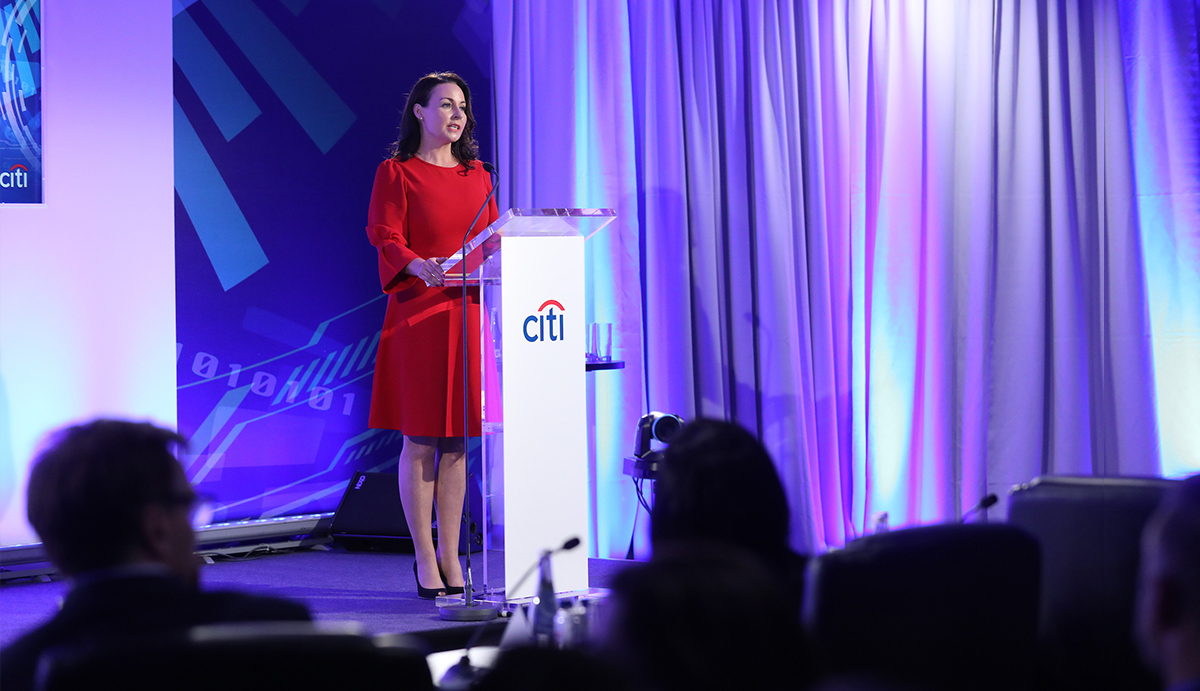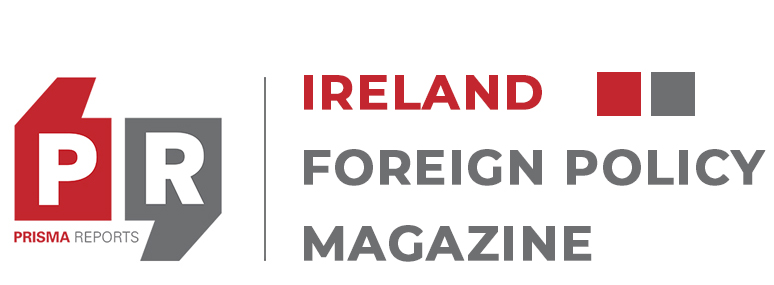
19 Sep Financial industry sees Ireland as EU foothold
Cecilia Ronan, Managing Director, Citibank Europe, discusses the strategic positioning of Ireland’s financial services sector and the country’s continued resiliency in face of Brexit and the COVID-19 pandemic
Why is Ireland an attractive place to set up operations?
We have come through a lot of different bumps on the road as a country. If you look at 2020, it was an exceptionally challenging year for every country in the world. It was essentially a one-in-a-hundred-year event. The country has shown remarkable resilience in its economic recovery. We have one of the highest gross domestic product growth rates and projected rates in the whole of Europe. We must be mindful that it is possibly going to be K-shaped recovery. Multinationals are a significant contributor to our recovery — many of the goods and services here are exported by multinationals around the globe, including the services Citi offers clients from Ireland. Government support for small and medium-sized enterprises and indigenous businesses was significant.
Ireland has a probusiness environment; the ease of doing business is high. We have a highly diverse ecosystem, ranging from tech, pharmaceutical and financial services companies. This enables collaboration and breeds innovation. For example, the idea for our latest innovation lab came from one of our clients. There is diversity in the financial services sector, including aircraft leasing, the funds business, insurance and international financial services. The strong talent pool, access to the EU and being the only English-speaking country in the EU is a real advantage for us. This is in addition to an attractive corporate tax rate. This combination gives us the ability to move up the value chain.
Over the years we have moved approximately 800 lower-value roles to locations out of Ireland and moved approximately 1,000 higher-value roles into Ireland. We have been able to reskill people by placing many thought leaders here. Our people can have a global career while based in Dublin. There is a culture of adaptability, flexibility and productivity. The idea of client experience is natural to us.
What was Citibank Europe’s growth trajectory in the country?
Citi puts the client at the heart of everything we do. We came to Ireland in 1965 and have been providing support to Irish, European and global clients ever since. We were relatively small for many years until all ingredients came together to pitch Ireland as a global service center. Our vision was to be a profit center out of Ireland, matching the capabilities we had built with our products. We grew rapidly in the ’90s and into the 2000s from about 80 to 1,500 people. We brought our global WorldLink Payment Services to be run out of Ireland for the whole of Citi. Since then, we have brought 25 products, some coming as a result of the bank’s response to Brexit to strengthen our ability to serve EU clients.
The last missing piece was an evolution in innovation and technology. In 2009, we opened our innovation lab in the middle of the last financial crisis. We turned the predicament into an opportunity. We were working with Intel who had an innovation lab, and we wanted to mirror what they were doing. However, it is much harder in the financial services sector because our products are intangible. Together with our clients, multinationals and the government, we worked to set up the first innovation center for financial services.
Subsequently, in 2021 Citi opened its Artificial Intelligence Centre of Excellence in Dublin. There was a significant amount of research and development support provided by the government. Today we are now the European bank headquarters for Citi, responsible for close to 12 thousand people in 22 countries with a balance sheet that has risen from $25 billion to close to $80 billion.
How has Ireland’s financial services industry braved the COVID-19 and Brexit crises?
Ireland and the financial services sector had to contend with these twin shocks. From a country point of view, there needs to be a smooth withdrawal of government support. There also requires some debt sustainability and a review in terms of what refinancing looks like. With current interest rates, we are not in a bad position. The ability for the financial industry to get two and a half thousand people to move to remote working in the space of about 48 hours, continue with our services and manage our risks has proven the industry operationally and financially resilient.
Brexit was not good for Ireland as a country considering our long history with our closest neighbor and trade partner. From a financial services point of view, we had established our European bank pre-Brexit, which meant we were already under the European Central Bank with breadth across all countries. We looked at products that needed to be potentially housed in Ireland related to connectivity with the EU as opposed to going through the U.K. We currently have all the euro clearing through the country for 78 nations. We have also built pooling capability. For example, these operations in Amsterdam will be extended to Dublin and Luxembourg. We also centered our custody business out of Ireland to simplify it for our clients.
One of the key things going forward with Brexit will be understanding of what the next stage will look like. Brexit has only just begun. We must work astutely. We do not want to overcomplicate the process, but we also need to make sure we are considering the continued impact of the U.K. leaving the EU.
How has Citi and the financial services sector incorporated sustainability as a key tenet?
The whole concept of environmental, social and corporate governance has been accelerated by the COVID-19 pandemic. We need to understand what we want to contribute to society. At Citi, this translates into our commitment to have net-zero carbon emissions by 2050. We also want to support our clients with green bonds. A third aspect is taxonomy. There is a bit of arbitrage happening as to what is green versus what is brown. Going through a gradual transition in agreed taxonomy will be key in managing benefits and risks. Europe is further ahead than the U.S., although that should change with the new U.S. administration.
What impact does the U.S. multinational presence have on Ireland?
There are 800 U.S. firms based out of Ireland with a diversity of business and skills across the multinational sector. For many years if people wanted significant career growth, they would have had to emigrate. Now, they can have those types of roles right here in Ireland. We positively welcome the return of what we see as multilateralism under the Biden administration, which will indeed support opportunities even more.
Our clients are international, specifically Irish clients that want to go global and global clients that want to expand their network. In that sense, it is extremely important to have firms like ours that have that network and engagement relationship history with the U.S. and the world.
What relationship does Citi have with the rising number of fintech companies?
Fintech is not a new phenomenon. Many diverse companies here are extraordinarily supportive of the startup culture. We split our fintech collaborations into three categories: partners, clients and competitors. We partner with fintech companies because we see the emerging technology they are bringing out. Citi has a venture arm in California that takes part ownership in them or adopts their technology and uses it. Startups launch in a certain country and generally want to go global as soon as possible. They typically use our network to take them across markets rather than building it themselves. For example, Stripe and Uber are two of our large clients.
As competitors, they are often more agile than us. Therefore, it is absolutely key we invest in our own digital capabilities. Business and supply chain models of our clients are changing quite significantly and we need to continue to support them. We used to be pushing digital, real-time capability and instant payments, but fintech companies are now pulling it from us. Payment is one of the biggest areas for fintechs in Ireland, but there is also growth in digital currencies and regulatory technology, amongst others.
The future will be focused on what the culture of work looks like and how we ensure innovation and collaboration. New ideas must continue to be generated in the new digital environment; it is key. Rapid advancement of our digital capabilities is required by our clients. In the last few years there has been a convergence of consumer and corporate expectations, where corporates want to have the same seamless digital experience they get at a consumer level.

No Comments